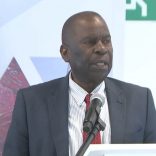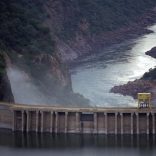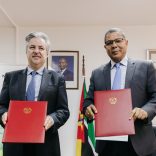Mozambique: Chapo discusses gas and agriculture with head of ENI - AIM report
OP-ED: London Court of Appeal legalises UK Government investment in Rovuma basin natural gas – By Florival Mucave

The Court of Appeal in London, UK ruled that the investment of US$1.15 billion by the British government through UK Export Finance (UKEF) in the Rovuma Basin Area1 liquefied natural gas (LNG) project is Legal.
UK Export Finance has committed to provide loans and guarantees to banks, directed towards the design, construction and operation of the Area1 LNG project in the Rovuma Basin.
With this decision, the London Court of Appeal dismissed an appeal made by the British Non-Governmental Organisation (NGO) “Friends of the Earth”, which has been selflessly trying to outlaw the British Government’s decision to fund the Rovuma Basin LNG project.
READ: UK’s $1.15 bln funding for Mozambique LNG project lawful -court
Friends of the Earth’s argument is that the funding of the Rovuma Basin LNG project by the British government, through UKEF is incongruous with the commitments it undertook in the Paris Climate Change Accords.
Although I am very much aware of the dreadful impact of climate change in the world, particularly in Mozambique where cyclones Idai and Kenneth devastated the provinces of Sofala and Cabo-Delgado, it is not possible for me to downplay the importance of the natural gas projects in the Rovuma Basin in the fight against poverty, especially taking into account the fact that the exploitation of this natural gas could have a multiplying effect on the national economy and elevate Mozambique from one of the poorest countries in the world (LDC) to a middle-income country in the next fifteen (15) years, doubling its GDP.
The London Court of Appeal’s decision represents a major triumph for Mozambique, a country with the third largest natural gas reserves in the world, and also represents an important legal precedent for the various oil and gas projects on the African continent and worldwide.
Projects of major socio-economic importance to the African continent such as, the East African Crude Oil Pipeline currently under construction between the Lake Victoria oil fields in Uganda and the port of Tanga in Tanzania, as well as oil and gas exploration projects in the Walvis and Orange Basins in Namibia among other various projects. They would be at risk if the London Court of Appeal had set a legal precedent making it illegal for countries that are signatories to the Paris Climate Change Accords, their banks or insurers, to finance and/or insure oil and gas projects in developing countries. Such a decision would itself be contrary to the letter and spirit of the Paris Accords, which call for differentiated treatment for developing countries in implementing their obligations.
It is also worth highlighting that in 2022, the UK Government, a signatory country of the Paris Climate Change Agreements, granted permission for 30 new licenses for oil exploration and exploitation in the North Sea. Several European Union countries have also rescheduled the closure of their coal-fired power plants, thus, postponing the implementation of their climate targets.
In this context, lawsuits of a frivolous nature such as that of “Friends of the Earth”, in the case of the UKEF funding of the Rovuma Basin Area 1 project could have catastrophic consequences for Mozambique, such as foreign disinvestments in the hydrocarbon sector, resulting in increased unemployment, crime and poverty.
Ultimately, Mozambique’s narrative in the debate on climate change should establish a correlation between the exploitation of natural gas as transitional energy and the fight against poverty. The construction of this narrative depends entirely on Mozambique’s capacity to establish a strategic vision and define short, medium and long term solutions appropriate to the national context for a horizon beyond net-Zero 2050.
By: Florival Mucave













Leave a Reply
Be the First to Comment!
You must be logged in to post a comment.
You must be logged in to post a comment.